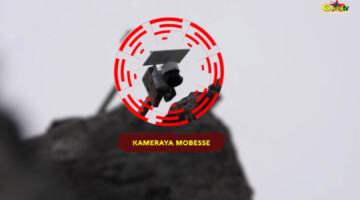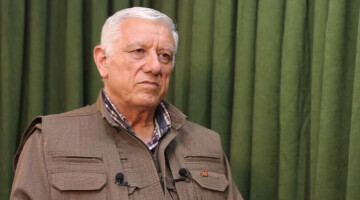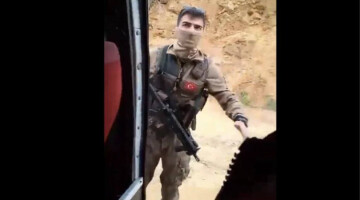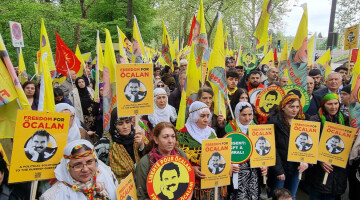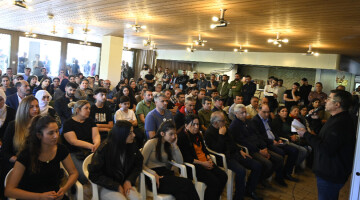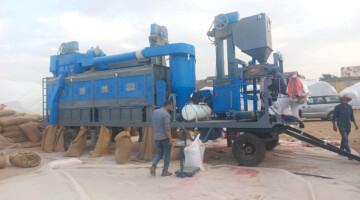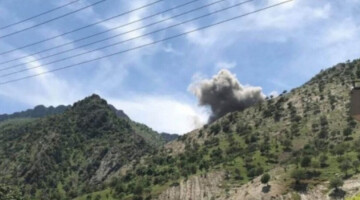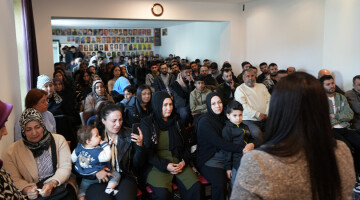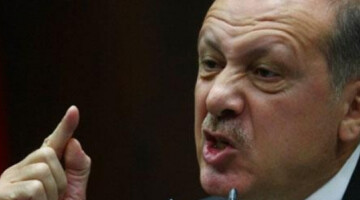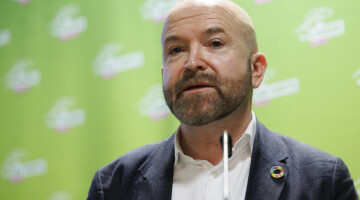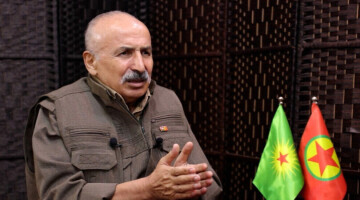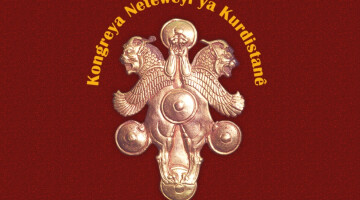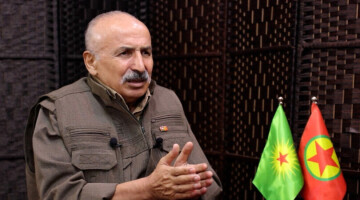Independent author, copy editor, and graphic artist Janet Biehl stated that the Turkish state has a profound and longstanding hatred for the 20 million Kurds within its borders, and its war against the Kurdish people continues today.
Biehl spoke to ANF English service about the current situation in North Kurdistan, Kurdish people's self-rule project and Kurdish leader Abdullah Öcalan's role in the achievement of lasting peace.
How do you evaluate the current situation in North Kurdistan where Kurdish people are determined to build self-rule in response to the never-ending attacks by the Turkish state?
The Turkish state has a profound and longstanding hatred for the 20 million Kurds within its borders. It has spent most of the past few decades trying to stamp out their desires for basic cultural and linguistic and political and human rights. It waged war against the PKK in its war for a Kurdish state, killing thousands. This process continues today, as the Turkish air force bombards PKK forces and bases. And even today it imposes around-the-clock, shoot-to-kill curfews on Kurdish towns and cities that support self-rule, like Cizre and Silvan.
Why did the AKP government lay Dolmabahçe Agreement aside and escalate conflict in the Kurdish region after the general election of June 7? What is its plan?
In November 2012, the AKP announced that it wanted to revise the constitution to create a new executive presidential system, in which the president would have powers to appoint and dismiss governors, ministers, and half the constitutional judges; to dissolve Parliament at will; and to enact edicts without Parliament’s consent. This system therefore would create a dictatorship.
In the June 2015 election, the AKP hoped to get enough members in Parliament to achieve this system. But the HDP, a pro-Kurdish party, gained support from the pan-Turkish democratic left and scored a stunning victory. It far surpassed the 10 percent hurdle that had been set up to keep pro-Kurdish parties out of Parliament. Its almost 14 percent not only surpassed this hurdle but denied the ruling AKP a parliamentary majority for the first time in eighteen years.
Eager to regain a majority, the AKP abjured the peace process with the Kurds. It set aside the Dolmabahçe Agreement and demagogically stoked up animosity toward the Kurds. It denounced the HDP as “terrorist.” Bloody bombings in Diyarbakir, Suruc, and Ankara were attributed to Daesh but targeted only HDP activists. Scores of HDP offices were ransacked or torched as police stood by. The AKP government announced to the US that Turkey was “going to war” with Daesh but instead unleashed the Turkish military against PKK forces in Iraq.
What is your opinion regarding the aggravated isolation imposed on Kurdish people's leader Abdullah Öcalan, whose freedom is considered essential for the achievement of lasting peace?
Öcalan should be freed, as he is the representative chosen by the Kurdish freedom movement in its relations to the Turkish state. Under his leadership, the Kurdish movement and its allies promote a democratic alternative based on grassroots, bottom-up, participatory administrative bodies. Civil liberties are upheld, and women’s emancipation is put into practice. Ocalan’s concept seeks to obstruct any future political hegemony and instead shape a multiethnic, multireligious, multcultural society.
The PKK remains on the international list of terrorist organizations. Do you think the world has recognized the deserved importance to the Kurdish movement in relation to its battle against ISIS, which targets not only Kurds and other minorities in the Middle East but all humanity?
When the United States designated the PKK as a terrorist group in 1997 and the EU in 2002, their justification was that the PKK was “disrupting NATO interests in the Middle East.” But today it is Turkey that is disrupting NATO’s interests in the Middle East, its fight against Daesh, , a spin-off of Saudi Wahhabism.. The AKP government has worked to cripple the forces fighting Daesh and has been aiding Daesh itself, through the Jihadi Highway, a supply line running from Turkey to Syria. It helps the jihadists recruit and train fighters. It provides those fighters with transportation and logistical assistance and even military equipment and medical care. It supports Daesh financially by purchasing its oil. It supports Daesh because it wants to see the Kurds defeated.
Meanwhile the PKK, far from “disrupting NATO interests in the Middle East,” is acting in accordance with them by fighting Daesh. And far from terrorizing civilians, it has adopted a strict policy of never harming them. It protects communities against the jihadists and rescues them, as it did the Yezidis threatened with genocide in 2014. Its embrace of assembly democracy and gender equality counters every aspect of Daesh ideology and practice. It seeks peace talks with the Turkish government,, announcing several unilateral cease-fires; in March 2013 it initiated a two-year long peace process. It is no longer even technically separatist. Informed by democratic confederalism and ideals of gender equality it is attempting to move beyond the colonial state system that so long wrought havoc in the Middle East.
Against Daesh, the PKK and its Syrian affiliates the YPG and YPJ have proved extraordinarily militarily effective, at Kobane, Sinjar, Tal Abyad, and elsewhere. It liberated 200 villages in only two weeks in November.
As such, it cooperates with the US-led coalition in the war against Daesh. In October 2014, the U.S. began direct talks with the PYD. Since then the US has been providing the YPG with arms, to the consternation of Turkey. On Nov. 8, 2015, the State Department said it wouldn’t allow Turkey to attack the YPG in Syria, although such attacks have taken place.
Thus the US acknowledges the military successes of the Kurdish forces against Daesh, but it still defers to Turkey by allowing it to attack the PKK. Quite obviously, it is schizophrenic for the US to work with PKK affiliates on the one hand and define the PKK itself as terrorist. This contradiction cannot stand. The US should remove the PKK from the State Department’s list of foreign terrorist organizations.
As the reconstruction of Kobanê continues, Kurds now face the task of rebuilding the recently liberated Êzîdî town of Shengal in addition to fighting and defeating the ISIS. Which contribution should the world provide to Kurds in this regard? Do you find the current support sufficient?
Governments with any sense of human decency should supply humanitarian aid to Kobane and to Sinjar, and they should provide heavy weapons to Kurdish forces fighting Daesh.
As someone quite familiar with Rojava revolution, what importance do you think does the Öcalan-derived model of Democratic Autonomy have for the future of Syria and the Middle East? Can it set a precedent for the establishment of a libertarian system in the entire territory?
No unitary system can be installed again in Syria. The country must be decentralized along the model of democratic confederalism in a Democratic Nation. I think the women of the Middle East are a sleeping giant in this respect—women regardless of ethnicity confront similar problems with patriarchy, and together they can solve them. One reason the ethnic inclusiveness of Rojava works, I think, is because the women of different ethnicities openly discuss their common problems and work for solutions.
With regards to the leading role of Kurdish female combatants in the battle against ISIS, which treats women as slaves, do you think this struggle of Kurdish women has also had an influence on women worldwide?
Last year, the defense of Kobane showed everyone the mobilization power of the entire Kurdish community but especially the women. People worldwide admire the women of the YPJ for their bravery in rejecting their traditional roles, for fighting for their autonomy, and for willingly facing an unknown future in the war against jihadists.
Is ecology a part of democracy? What is your opinion about the “ecologic society” concept highlighted by PKK leader Öcalan as a part of building a democratic self-government?
Ecology is essential to the survival of human life on earth, and democracy is necessary to create a society that is ecological. Only a popular democracy can keep decision making out of the hands of the powerful and the corporations and under the control of the people, who won’t allow their planet to be choked and polluted and toasted to death for the economic gain of a very few.
JANET BIEHL
Focusing on Social Ecology, Communalism and Ecofeminist Politics, Janet Biehl worked long years with Murray Bookchin, today's foremost social theorist and political philosopher of the libertarian left. Alongside an international delegation, Biehl paid a visit to Rojava’s Cezire canton where they learned about the ongoing revolution in early December last year.

